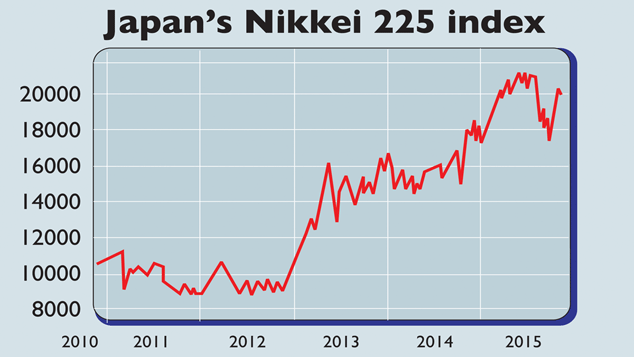Japan is still a buy
Japan is in recession for the fifth time in seven years, says Andrew Van Sickle. But things are not as bad as they seem.

Get the latest financial news, insights and expert analysis from our award-winning MoneyWeek team, to help you understand what really matters when it comes to your finances.
You are now subscribed
Your newsletter sign-up was successful
Want to add more newsletters?

Japan is in recession for the fifth time in seven years. The economy shrank at an annual pace of 0.8% in the third quarter. There was a similar slide between April and June. That puts Japan in a technical recession. Yet "under the hood, the Japanese economic engine is sputtering less" than it seems, notes The Economist. Its potential growth rate is only a little above zero, because its working-age population is falling by around 1% a year, so it doesn't take much of a dip for growth to go negative.
America's potential growth rate, on the other hand, is around 2%. "It is as if the US is a couple of metres away from the swimming pool but Japan is walking along the edge and needs only a slight nudge to fall in," says Robin Harding in the Financial Times.
Besides, as various analysts have noted, two areas that have struggled recently, net exports and consumption, which account for around 60% of GDP between them, both rose. The latter notched up an annual gain of 2.1% in the third quarter. Unemployment is just 3.4% and should keep falling the number of jobs available per jobseeker is at a 23-year high. That implies higher wages and spending.
Try 6 free issues of MoneyWeek today
Get unparalleled financial insight, analysis and expert opinion you can profit from.

Sign up to Money Morning
Don't miss the latest investment and personal finances news, market analysis, plus money-saving tips with our free twice-daily newsletter
Don't miss the latest investment and personal finances news, market analysis, plus money-saving tips with our free twice-daily newsletter
Moreover, says Lex in the FT, the money-printing spree we have seen in recent years under Prime Minister Shinzo Abe has lit a rocket under corporate profits as the yen fell, with exporters doing especially well. The hope now is the "flood of money will eventually shift the pattern of growth in a more domestic direction". The economy should see more corporate investment, "as well as freer-spending households". Meanwhile, stripping out energy prices, inflation is around 1% a year.
This is why the Bank of Japan didn't feel the need to step up quantitativeeasing (QE) . It has already printed money worth around 70% of GDP. The US and UK's QE programmes were worth a respective 25% and 20%. There has also been gradual progress on structural reforms to boost productivity and potential growth.
The government has pushed for more women to enter the workforce and signed up to the Trans-Pacific Partnership, a free-trade deal that should open up sectors such as agriculture to more competition. A new corporate governance code has made firms more shareholder-friendly. A slowly improving economy, reasonable valuations and plenty of liquidity means Japan's stockmarket remains a buy.
Get the latest financial news, insights and expert analysis from our award-winning MoneyWeek team, to help you understand what really matters when it comes to your finances.

-
 Financial education: how to teach children about money
Financial education: how to teach children about moneyFinancial education was added to the national curriculum more than a decade ago, but it doesn’t seem to have done much good. It’s time to take back control
-
 Investing in Taiwan: profit from the rise of Asia’s Silicon Valley
Investing in Taiwan: profit from the rise of Asia’s Silicon ValleyTaiwan has become a technology manufacturing powerhouse. Smart investors should buy in now, says Matthew Partridge